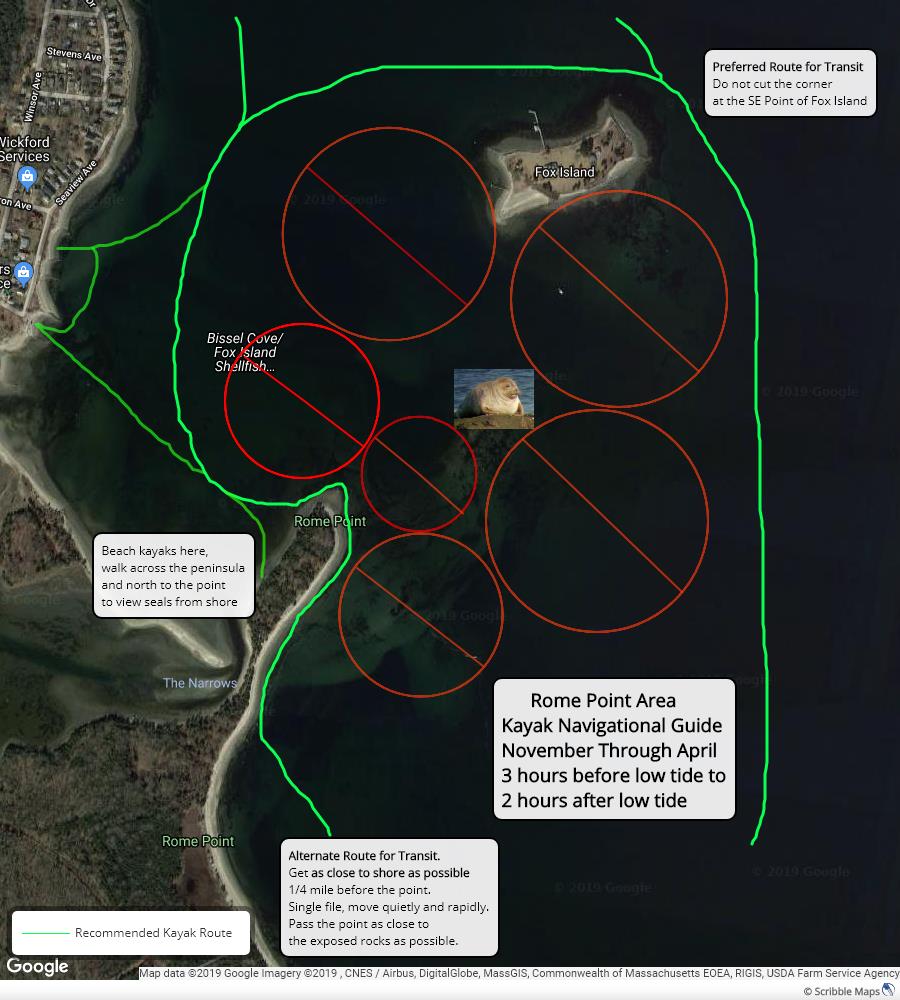Incidents of the seals at Rome Point being flushed (spooked off of the rocks by watercraft) and chased away from the haul-out site occur too often, particularly on nice Spring weekends. In most cases, non-motorized watercraft are responsible for these unfortunate occurrences. Seals need their rest and the stress associated with being chased from the rocks has a negative impact on these animals. During periods of nice weather, the seals may be harassed repeatedly several times in a day or on consecutive days by a veritable parade of different watercraft. Being disturbed is especially troublesome for the pregnant female seals in the spring; pup-bearing seals need to conserve their energy for their migration and subsequent nursing of their young. In addition, the thoughtless flushing of the seals can spoil an outing for hopeful seal watchers who have hiked out to Rome Point to observe seals in a responsible manner, or for families who have paid to take a guided boat-based seal tour.
Harbor Seals are federally protected under the Federal Marine Mammal Protection Act (50 CFR 216), which is enforced by the National Oceanographic and Atmospheric Administration (NOAA). According to the NOAA Fisheries Seal Viewing Guidelines, under this law it is illegal to harass or harm a seal, or disturb a sealís natural behaviors. Harass is defined as" to annoy persistently" or "to create an unpleasant or hostile situation by uninvited and unwelcome verbal or physical conduct" (Merriam-Webster). If a seal is sleeping and is awakened by an unnatural disturbance sufficient to force the animal to flee, we are unclear as to how that could be determined to be anything other than harassment. When this event occurs on a regular basis such that the seal's natural behavior is repeatedly altered, the proposition that this animal is being harassed is beyond dispute in our view.
Romepointseals.org does not look kindly upon watercraft operators who disturb or harass the seals. We have been monitoring this location for over 20 years and have taken detailed notes recording the names, registration numbers, and descriptions of boats and kayaks that have disturbed or harassed the seals in the past. Everyone deserves the benefit of the doubt; however, after 20 years of this nonsense and in light of significant seal harassment at Rome Point on nice days, our patience is wearing thin. Repeat or intentional blatant violators of the Federal Marine Mammal Protection Act will be videotaped up close through our high magnification, camera-equipped sport optics and this evidence may be presented to support a mandatory area closure or other law enforcement action. This area is frequently under video surveillance, so anyone who chooses to get too close and flush the seals, please smile, you're on seal watch camera.
We recognize that in most cases mariners do not intend to cause any harm, they just want to get a close-up look at the seals. Our sympathy lies especially with kayakers and paddle boarders, who may not realize that harbor seals are especially sensitive to their presence and are frequently flushed by non-motorized watercraft at a distance as far as 1/2 mile away. The cumulative effect of repeated mass seal disturbance events is disrupting the seals' natural behavior in a manner that is both socially unacceptable, detrimental to the seals' well being. Our data indicates that the number of seals wintering at Rome Point during the months of November through February has decreased by nearly 25%, and sightings of yearling seals have gone down by 50%, since 2012. In addition, we have observed that some seals appear to be near exhaustion when they haul out on days that have been preceded by one or more days when the seal's have been flushed out of the area early in their rest cycle.
Accordingly, we have developed the map delineating the recommended routes and closed area for non-motorized watercraft during the seal season shown below. While the closure and the routes shown are seasonal and tide-based voluntary recommendations, flushing these seals, even accidentally, is, in our opinion, a technical violation of federal law. Knowledgeable paddlers have long shown the seals the respect they deserve, and we are greatly appreciative of the consideration they given to the resting seals over the years. We are also grateful for the cooperation of other friends of the seals, such as the nearby aquaculture operators who have gone out of their way not to disturb the sleeping seals. However, it is the responsibility of everyone who navigates on a large body of water such as Narragansett Bay to know the applicable rules and laws as they pertain to local conditions, and to be aware of their surroundings.

Mariners who are navigating in the vicinity of hauled-out seals are advised to observe the following guidelines.